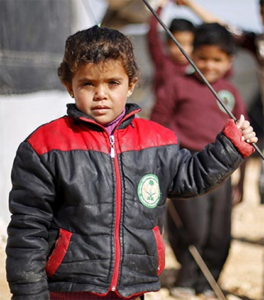UK removes protections for child refugees
One of the results of Boris Johnson’s election win in the UK elections was that protections for unaccompanied child refugees have been removed.
The Conservative government has removed the protections from its EU Withdrawal Bill meaning that the legal means but which child refugees can enter Britain have been all but axed.
 A few weeks after the UK Parliament returned from a winter the Conservatives rejected the Labour Party’s amendment to the Brexit bill, which sought to protect the right of unaccompanied child refugees to join family living in the UK after Brexit.
A few weeks after the UK Parliament returned from a winter the Conservatives rejected the Labour Party’s amendment to the Brexit bill, which sought to protect the right of unaccompanied child refugees to join family living in the UK after Brexit.
The bill will now go to the House Lords, where Labour peer and tireless campaigner for refugee rights Lord Alf Dubs hopes his colleagues will take up his fight to stop the government stripping away these rights.
Lord Dubs recently described being called to a meeting with three Home Office ministers and seven officials, in which he was asked to stop pressuring the government to reinstate the protections for child migrants.
“They asked me to accept the government’s commitment that they were still on side with this, to believe them,” he told The Guardian.
Observers say the striking out of the Dubs amendment is not going to make children less likely to come to the UK, but it will make their journey far more dangerous.
They say that with fewer legal ways to get to this country, more children will have no choice but to make perilous crossings across violent borders and treacherous seas, some with the help of smugglers – the same smugglers British politicians claim to want to stop.
This is a familiar story across Europe and much of the world over the past decade.
Safe routes have been closed down; search and rescue missions cut; and deals made between countries to stop people from moving.
But people seeking asylum have not stopped doing so; they have simply been forced to make ever more perilous journeys to try to reach safety.
Over the past ten years, 10,000 unaccompanied children have had to risk their lives to get to the UK, according to the legal charity Safe Passage.
Critics say the provisions put in place by the UK government has put are pitiful.
In 2016, the government began a resettlement scheme for unaccompanied child refugees from the Middle East and North Africa. But by 2018, only 20 children had been allowed into the UK through the scheme.
At around the same time, in the spring of 2016, Lord Dubs was pushing for 3,000 children to be resettled from Europe.
UK MPs rejected the target saying instead that they would support “a specified number” which turned out to be just 480.
Refugee advocate Celia Godwin says the moves to stop child refugees entering the UK is result of how immigration and asylum are talked about in the UK.
“We hear about ‘bogus asylum seekers’ and ‘illegal immigrants’; imagery which casts doubt and strips people of their humanity,” Ms Godwin said.
“People seeking asylum are, at best, considered at a problem to be managed; at worst, they are treated with suspicion, their honesty about their suffering doubted,” she said.












